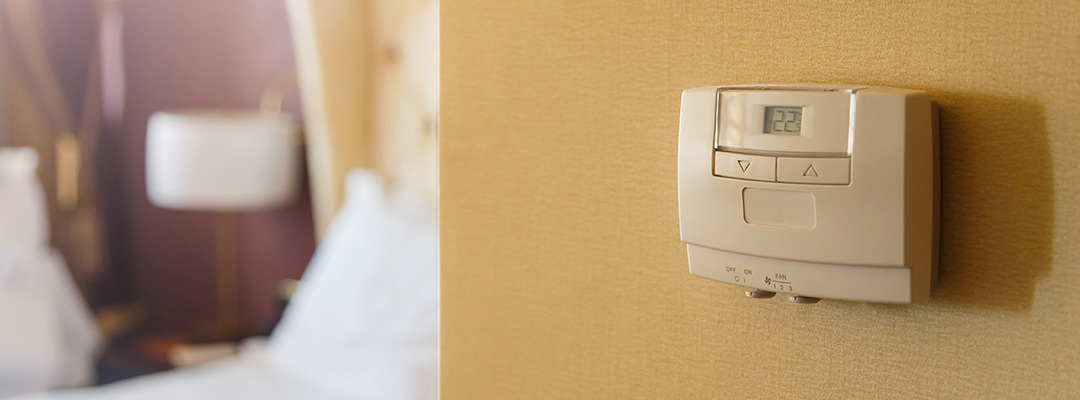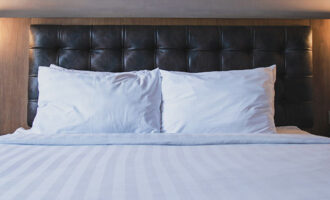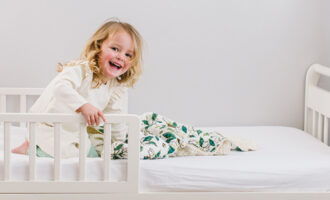The setting in which you sleep has a significant impact on how well you sleep every night. For example, if you recall sleeping in your bed during a hot summer night, it was most probably not a pleasant experience.
This is because ordinary humans necessitate specific conditions to enjoy good sleep. Turning and tossing during the night could occur for various reasons, one of which you may not be aware of is the temperature in your room.
Without a doubt, a considerable percentage of people understand what it is like to burn throughout a summer heatwave or awaken with cold feet outside the covers, mainly during winter. Nevertheless, even minor temperature fluctuations could have a positive or negative impact on your quality of sleep.
Most sleep specialists suggest that the ideal sleeping temp is between 60- and 67-degrees Fahrenheit. But do you know why? Continue reading to find out how temperature affects your sleep and what you could do to enhance your sleeping quality.
How Does Room Temperature Affect Sleep Quality?
Before delving into the impact of temp on your sleep quality, it is critical to know your body’s primary mechanism for awakening and falling asleep: your circadian rhythm. The biological clock causes your body temp to rise and fall on a 24-hour cycle.
As a result, your core body temperature is comparatively high during the day, indicating a greater wake drive, and ideally low during the night, indicating a reduced wake drive.
Because of your biological clock, your body cools whenever you are ready for bed, reaching its lowest temperature around 3 and 6 a.m. To cool down, your blood vessels dilate within your skin. You may realize this during the night if your feet and hands first feel warm; this is heat leaving via your skin.
Professionals in sleep acknowledge that the temperature of your sleeping setting influences your sleep quality and its duration. Once you are ready for bed, your central body temp falls since your brain is attempting to reach a ‘set point.’
If you rest in a sweltering room, it may prevent heat loss, making it very difficult to decrease your chief body temperature. An excessively chilly temperature, on the other hand, may result in cold feet and hands. To save heat, the vessels constrict, causing your skin to become chilled and heat to remain in your body.
Both your skin and core temperatures must be within a specified range. If it exceeds this range, arousal processes are engaged, resulting in wakefulness or even lighter sleep.
Should the Temperature Change According to Age?
Even though your optimal sleep temperature might alter as you age owing to aging and weight adjustments, it will most probably remain in the 60s for the rest of your life. Even so, females going through menopause may choose colder sleeping surroundings to remedy hot flashes and other hormonal impacts.
Professionals suggest keeping your baby’s room temperature around 60- and 68-degrees Fahrenheit- provided they are appropriately clothed!
Infants have a more difficult time controlling their body temperature and do not sleep with blankets (as it presents a wellness risk). As a result, their tiny, more delicate bodies may require several more degrees to keep warm at night.
It is critical to be wary of your baby heating, as this might raise the danger of unforeseen infant death syndrome (SIDS). This is more common during the winter than in summer.
Feel the backside of your baby’s neck or tummy while they are sleeping to assess their temperature. Strip a piece of clothing if you feel their skin is heated or sweaty to allow them to cool.
Most adults like sleeping temperatures ranging from 60 to 72 degrees Fahrenheit (15 to 22 degrees Celsius). The perfect temperature for the aged is between 66 and 70°F (19-21°C). It is also critical to maintaining the temperatures in the sitting room and bedroom equal.
Above everything else, a great deal will be determined by your individual preferences. Some people sleep hot naturally, while others sleep chilly. It is natural to deviate from these suggested figures based on what ensures you feel most at ease.
This becomes substantially more challenging if you rest with a companion. Your bed partner might like slightly warmer sleeping conditions, but you may enjoy the polar opposite. Find a reasonable intermediate temperature where you are both pleased or purchase equipment that allows you to make yourself cooler or warmer independently.
What’s the Best Sleeping Temperature for Winter Time?
It becomes freezing throughout winter, particularly in northern areas; hence, it is best to maintain the room warmer to account for temperature reductions at night. In addition, some people have a difficult time falling asleep during the winter.
Fortunately, after collecting expert opinions and conducting studies and research, the following compiled ideas could help you enjoy the best possible rest throughout the cooler winter periods:
- Maintain room temperature around 60 and 72 degrees
- If your skin or nose is dry, utilize a humidifier
- Keep several layers of blankets on your bed to withstand temperature variations or differing requirements for partners
- Maintain your feet and hands warm using a warm water bottle or wear socks
- Make use of permeable bedding and climate-controlling equipment
- Even during weekends, keep a regular sleep-wake routine
- Remain hydrated and active: engage in moderate exercise four to five hours before nighttime to help with temperature regulation
- Take a warm bath 1-2 hours before bed- the temperature decrease when you get out of the bathroom could render your body ready for sleep
- Get some natural light during the morning hours, whenever possible
- Take light dinners: cold weather is frequently associated with warm, heavy meals, which are not conducive to a great night’s sleep. Rather than potatoes and meat for dinner, try cooking your own healthy soup.
Final Thoughts: Sleeping Comfortable and Cool
Excessively cold or hot temperatures at night are an inconvenient experience. An inappropriately controlled temp might cause sleep interruption and general poor-quality sleep. Therefore, it is critical to take precautions to keep your room at a comfortable sleeping temperature as you sleep every night.
And, if you are having trouble falling or staying asleep, it is a great idea to start by checking your thermostat before looking for additional remedies. It is generally a simple fix, which could significantly enhance your sleep. And with the additional winter sleep temperature considerations, you can enjoy better, prolonged rest and awaken feeling more rejuvenated.
Did you like it?4.5/5 (26)





